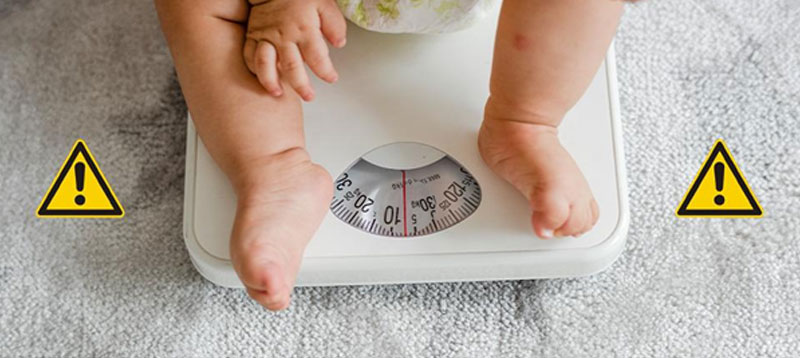
Exploring childhood obesity in the 21st century

Probably not, right because you want to inculcate good habits in them.
If you're so careful about helping them grow up to be responsible individuals, why are you not helping them grow up to be healthy individuals?
Confused? Let's break it down!
Every time you give in and give your child that glass of soft drink, or that bar of chocolate, or that samosa on your regular outing, have you wondered what you're doing to your child's internal organs and overall health?
Childhood obesity is a major issue in the 21st century!

According to the Indian Journal of Community Medicine, there's prevalence of obesity among school children aged 5-16 years ranged from 8.82% to 14.44%, with higher rates observed in urban regions compared to rural areas.

So, what are the habits that parents either don't pay attention to or don't know about that can increase childhood obesity?
-Overreliance on Fast Food: Regularly opting for fast food due to busy schedules, neglecting homemade meals rich in nutrients.
-Limited Physical Activity: Lack of encouragement for outdoor play, replaced by sedentary activities like TV or mobile games.
-Excessive Screen Time: Allowing unrestricted screen time, contributing to reduced physical activity and unhealthy snacking.
-Ignoring Portion Control: Serving oversized portions, unaware of appropriate serving sizes for children.
-Skipping Breakfast: Underestimating the importance of a nutritious breakfast, leading to overeating later in the day.
-Sweetened Beverages: Frequently offering sugary drinks instead of water, adding unnecessary calories to children's diets.
-Emotional Eating: Using food as a reward or comfort, fostering unhealthy relationships with eating habits.
-Limited Fruit and Vegetable Intake: Not prioritizing fresh fruits and vegetables in daily meals, missing out on essential vitamins and minerals.
-Late Night Eating: Allowing late-night snacking, disrupting sleep patterns and increasing calorie intake.
-Lack of Role Modeling: Not setting a positive example by practicing healthy eating and active lifestyles as parents.
So, when we speak about health and growing up to be healthy individuals, what can childhood obesity do to children?
-Heart Strain: Extra weight stresses the heart, leading to high blood pressure and heart diseases like heart attacks or strokes later in life, which can affect overall health and well-being.
-Liver Issues: Obesity can cause fatty liver disease, impairing liver function and increasing the risk of liver damage or failure, impacting digestion and overall health.
-Breathing Problems: Excess weight around the chest can make breathing difficult, causing conditions like asthma or sleep apnea, affecting sleep quality and energy levels.
-Joint Pain: The strain of excess weight on joints can cause pain and increase the risk of arthritis, making movement uncomfortable and hindering physical activity.
-Digestive Troubles: Obesity can lead to acidity, constipation, or gallstones, causing discomfort and affecting digestion, appetite, and nutrient absorption.
-Hormonal Imbalance: Extra fat cells can disrupt hormone balance, leading to irregular periods in girls or delayed puberty, affecting growth and development.
-Diabetes Risk: Obesity increases the risk of type 2 diabetes due to insulin resistance, requiring careful management and lifestyle changes to prevent complications.
-Weakened Immune System: Obesity weakens immunity, making children more susceptible to infections and illnesses, leading to frequent sickness and missed school days.
-Kidney Strain: Overworking due to excess weight can strain kidneys, leading to kidney problems like kidney stones or kidney disease, affecting overall health and kidney function.
-Mental Health Impact: Obesity can affect mental well-being, leading to low self-esteem, depression, or anxiety, impacting confidence, social interactions, and overall quality of life.
-Skin Issues: Obesity can lead to skin problems like rashes or fungal infections, due to excess sweating and friction, causing discomfort and affecting hygiene.
-Bone Health: Extra weight can affect bone development and strength, increasing the risk of fractures or skeletal deformities, impacting mobility and physical activity.
-Cholesterol Imbalance: Obesity can lead to high levels of cholesterol in the blood, increasing the risk of heart disease and stroke, requiring dietary changes and medical management.
-Gastrointestinal Disorders: Excess weight can cause gastrointestinal issues like acid reflux or bloating, leading to discomfort and affecting appetite and eating habits.
-Reproductive Issues: Obesity can affect reproductive health, leading to irregular menstrual cycles in girls or fertility problems in adults, impacting family planning and overall well-being.
-Sleep Disorders: Obesity increases the risk of sleep disorders like sleep apnea or insomnia, leading to daytime fatigue and affecting mood, concentration, and overall health.
-Thyroid Problems: Obesity can impact thyroid function, leading to hormonal imbalances and metabolic issues, affecting energy levels, metabolism, and overall health.
-Cancer Risks: Obesity is linked to an increased risk of certain cancers like breast or colon cancer, due to chronic inflammation and hormonal changes, requiring regular screening and lifestyle modifications.
-Quality of Life: Obesity reduces overall quality of life, affecting daily activities, mobility, and enjoyment of life, leading to decreased self-esteem and social isolation.
-Life Expectancy: Obesity can shorten life expectancy due to increased risks of chronic diseases and complications, highlighting the importance of healthy habits and weight management from childhood.
Parents, it is your responsibility to help your children grow up to be healthy individuals.
According to WHO, adequate nutrition during childhood is crucial for optimal growth and development. Poor nutrition can lead to stunted growth, underweight, or overweight, depending on the specific dietary deficiencies. Proper intake of essential nutrients such as proteins, vitamins, and minerals is essential for supporting healthy growth in children.
Now, we understand that it is difficult to know everything and include everything in your child's life and you're doing the best you can! That is why we're here to give you just a tad bit more information which you can easily inculcate into your routines to ensure your children get the best nutrition and beat childhood obesity!

So, what can you as parents do here:
-Home-Cooked Meals: Aim to cook meals at home using fresh ingredients whenever possible, avoiding processed foods and excessive oil or sugar.
-Balanced Diet: Ensure meals include a variety of foods from all food groups – grains, vegetables, fruits, dairy, and proteins – to provide essential nutrients for growth and development.
-Portion Control: Serve appropriate portion sizes to prevent overeating, using smaller plates and bowls to visually control portions.
-Regular Meal Times: Establish a routine with regular meal times to promote healthy eating habits and prevent excessive snacking.
-Hydration: Encourage drinking plenty of water throughout the day, limiting sugary beverages like sodas and juices.
-Healthy Snacks: Offer nutritious snacks like fruits, nuts, yogurt, or whole-grain snacks between meals to satisfy hunger and provide energy.
-Limit Junk Food: Reduce consumption of fried snacks, sweets, and fast food, reserving them for occasional treats rather than daily indulgences.
-Family Meals: Eat meals together as a family whenever possible, fostering communication and bonding while promoting healthy eating habits.
-Physical Activity: Encourage regular physical activity through fun activities like outdoor play, sports, or family walks, aiming for at least 60 minutes of activity daily.
-Limit Screen Time: Set limits on screen time for TV, computers, and mobile devices, promoting active play and interaction instead.
-Role Modeling: Be a positive role model by demonstrating healthy eating habits and an active lifestyle for children to emulate.
-Educational Tools: Use educational resources like books, videos, or games to teach children about nutrition and the importance of making healthy food choices.
-Grocery Shopping: Involve children in grocery shopping and meal planning, teaching them about different food groups and making healthy choices.
-Cooking Together: Cook meals together as a family, involving children in meal preparation to instill a love for cooking and appreciation for homemade food.
-Cultural Foods: Celebrate cultural diversity by including traditional Indian foods in meals, showcasing the rich flavors and nutritious ingredients of Indian cuisine.
-Food Exploration: Encourage children to explore new foods and flavors, offering a variety of fruits, vegetables, and dishes from different regions of India.
-Positive Reinforcement: Praise and reward children for making healthy food choices, reinforcing positive behaviors and attitudes towards nutrition.
-Meal Variety: Rotate meals to include a variety of flavors and textures, keeping meals interesting and satisfying for children.
-Open Communication: Keep communication channels open with children about food preferences, allergies, and concerns, allowing them to express their likes and dislikes.
-Seek Professional Guidance: Consult with pediatricians or nutritionists for personalized guidance and support in promoting healthy eating habits and preventing childhood obesity.

Parents. Do better. Be better.
Your efforts today will help your children beat childhood obesity and multiple health issues in the future!
For any help with diets related to children and childhood obesity, we're here for you!